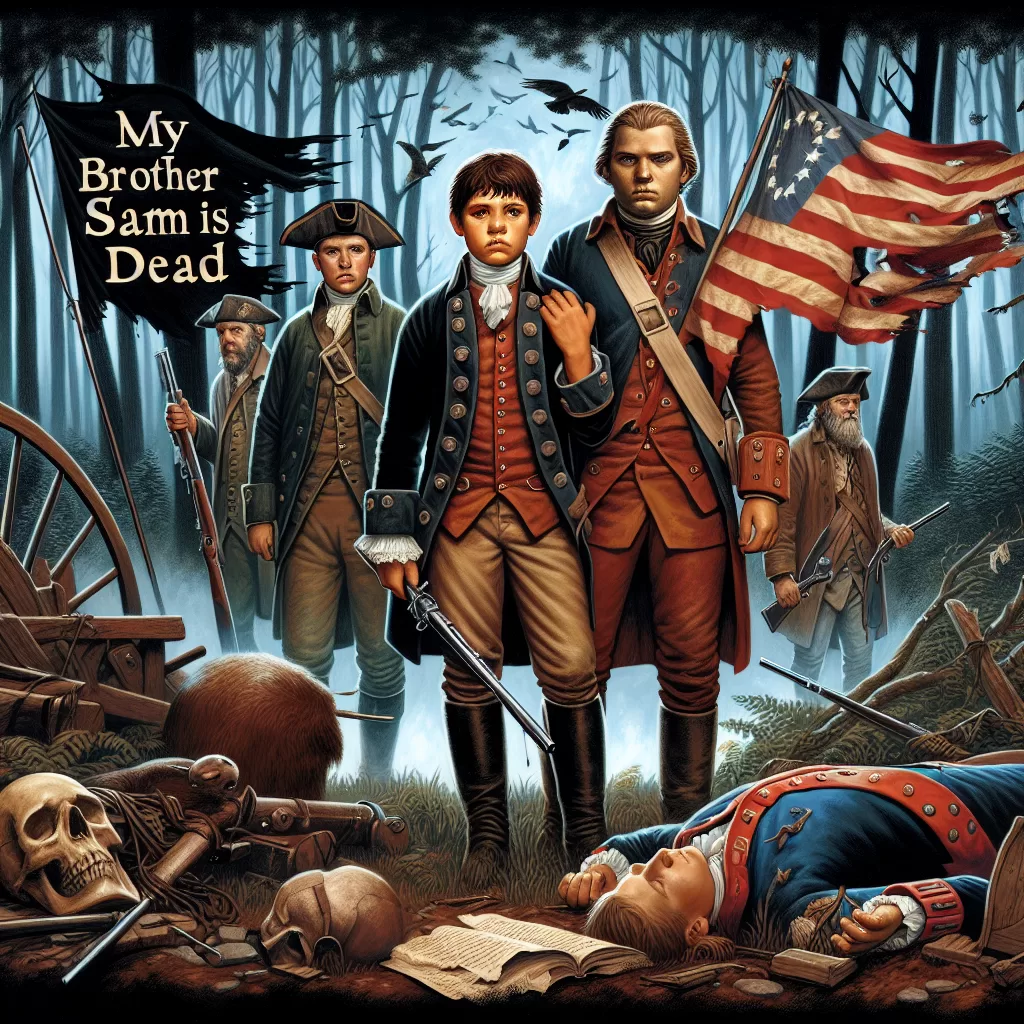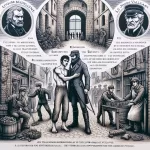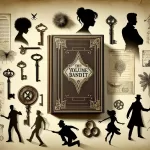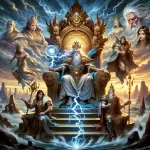-
İçindekiler
“My Brother Sam Is Dead” is a historical novel by James Lincoln Collier and Christopher Collier, set during the American Revolutionary War. The story is narrated by Tim Meeker, a young boy whose family is torn apart by the conflict. The central plot revolves around Tim’s relationship with his older brother, Sam, who becomes a soldier for the Patriot cause, while their father remains loyal to the British. The novel explores themes of loyalty, the impact of war on family dynamics, and the moral complexities of choosing sides in a conflict. Key characters include Tim, who grapples with his loyalties; Sam, who embodies the fervor of the Revolution; and their father, who represents the traditional values of loyalty and stability. Through their experiences, the novel delves into the personal and societal ramifications of war, ultimately highlighting the loss and sacrifice that accompany such tumultuous times.
Summary of My Brother Sam Is Dead
“My Brother Sam Is Dead,” a historical novel by James Lincoln Collier and Christopher Collier, is set during the American Revolutionary War and explores the complexities of family loyalty, the impact of war on personal relationships, and the moral dilemmas faced by individuals during times of conflict. The story is narrated by Tim Meeker, a young boy living in Redding, Connecticut, whose life is irrevocably altered by the war. The narrative begins with the introduction of Tim’s family, particularly his father, who is a staunch Loyalist, and his older brother, Sam, who passionately supports the Patriot cause. This ideological divide sets the stage for the unfolding drama, as Tim finds himself caught between his father’s loyalty to the British Crown and his brother’s fervent desire for independence.
As the story progresses, the tension within the Meeker family escalates. Sam, who has returned home after enlisting in the Continental Army, embodies the spirit of rebellion and the quest for freedom. His return brings both excitement and conflict, as Tim admires his brother’s bravery but also feels the weight of their father’s disapproval. The brothers’ differing views on the war create a rift that challenges their bond, forcing Tim to navigate his own beliefs while grappling with the expectations of his family. The narrative poignantly captures Tim’s internal struggle as he seeks to understand the implications of the war on his family and community.
The plot thickens when Sam’s involvement in the war leads to dire consequences. After being accused of theft and desertion, he is captured by the British and faces the threat of execution. This pivotal moment serves as a catalyst for Tim’s growth, as he is compelled to confront the harsh realities of war and the sacrifices it demands. The brothers’ relationship is tested further as Tim attempts to rescue Sam, illustrating the lengths to which he is willing to go for family loyalty. However, the harshness of war ultimately prevails, leading to a tragic conclusion that underscores the devastating impact of conflict on personal relationships.
Throughout the novel, the theme of loyalty emerges as a central focus. Tim’s journey reflects the struggle to reconcile his love for his brother with his respect for his father’s beliefs. This internal conflict is emblematic of the broader societal divisions during the Revolutionary War, where families were often torn apart by differing allegiances. The narrative also delves into the theme of coming of age, as Tim transitions from innocence to a more profound understanding of the complexities of human nature and the moral ambiguities of war. His experiences force him to confront difficult questions about right and wrong, loyalty and betrayal, ultimately shaping his identity in a world fraught with uncertainty.
In conclusion, “My Brother Sam Is Dead” serves as a poignant exploration of the effects of war on family dynamics and individual beliefs. Through Tim’s eyes, readers witness the profound impact of the Revolutionary War on personal relationships, as well as the moral dilemmas that arise in times of conflict. The novel not only captures the historical context of the era but also resonates with timeless themes of loyalty, sacrifice, and the painful choices that define the human experience. As such, it remains a powerful narrative that invites reflection on the complexities of loyalty and the cost of freedom.
Başlıca Temaların Analizi
“My Brother Sam Is Dead,” a historical novel by James Lincoln Collier and Christopher Collier, delves into the complexities of the American Revolutionary War through the lens of family dynamics and moral dilemmas. One of the most prominent themes in the novel is the conflict between loyalty to family and loyalty to one’s country. This theme is poignantly illustrated through the relationship between the protagonist, Tim Meeker, and his brother, Sam. As Sam becomes increasingly involved in the revolutionary cause, Tim finds himself torn between his admiration for his brother’s ideals and his loyalty to their father, who remains a staunch Loyalist. This internal struggle reflects the broader societal tensions of the time, as families were often divided by differing political beliefs, leading to profound emotional and ethical conflicts.
Moreover, the theme of the loss of innocence is intricately woven throughout the narrative. Tim’s journey from childhood to adulthood is marked by the harsh realities of war, which force him to confront the complexities of human nature and the consequences of violence. Initially, Tim views the war through a romanticized lens, influenced by the fervor of revolutionary rhetoric. However, as he witnesses the brutality of conflict and the impact it has on his family and community, his perspective shifts dramatically. This transformation underscores the novel’s exploration of how war can irrevocably alter one’s understanding of morality, loyalty, and justice.
In addition to these themes, the novel also addresses the concept of sacrifice. Characters in “My Brother Sam Is Dead” are faced with difficult choices that often require them to weigh personal desires against the greater good. Sam’s decision to join the Continental Army exemplifies this theme, as he is willing to risk everything for his beliefs. Conversely, Tim’s father, Mr. Meeker, embodies the sacrifices made for the sake of family stability and safety. The tension between these differing views on sacrifice highlights the varied motivations that drive individuals during times of conflict, ultimately prompting readers to reflect on the nature of commitment and the costs associated with it.
Furthermore, the theme of the impact of war on society is prevalent throughout the story. The novel illustrates how the Revolutionary War not only affects soldiers on the battlefield but also ripples through communities, altering relationships and social structures. The Meeker family’s experiences serve as a microcosm of the larger societal upheaval, showcasing how war can fracture familial bonds and disrupt the fabric of everyday life. This theme resonates with contemporary readers, as it emphasizes the enduring consequences of conflict on both personal and communal levels.
Lastly, the theme of moral ambiguity is intricately woven into the narrative, challenging readers to grapple with the complexities of right and wrong in times of war. Characters are often faced with morally gray situations, forcing them to make choices that may not align with their values or beliefs. This exploration of moral ambiguity invites readers to consider the difficult realities that individuals must navigate during tumultuous times, ultimately fostering a deeper understanding of the human experience in the face of adversity.
In conclusion, “My Brother Sam Is Dead” offers a rich tapestry of themes that resonate with readers, encouraging reflection on loyalty, sacrifice, loss of innocence, societal impact, and moral ambiguity. Through the experiences of Tim, Sam, and their family, the novel provides a poignant exploration of the human condition amidst the backdrop of war, making it a timeless piece of literature that continues to provoke thought and discussion.
Character Development of Tim Meeker
In the novel “My Brother Sam Is Dead” by James Lincoln Collier and Christopher Collier, the character development of Tim Meeker serves as a poignant lens through which the complexities of the American Revolutionary War are explored. Tim, the young protagonist, begins his journey as a naive and impressionable boy, deeply influenced by the contrasting ideologies of his family and the tumultuous world around him. As the narrative unfolds, Tim’s character evolves significantly, reflecting the broader themes of loyalty, conflict, and the loss of innocence.
Initially, Tim is depicted as a loyal son who admires his older brother, Sam, and is eager to please his father, who is staunchly loyal to the British Crown. This admiration for Sam, who embodies the spirit of rebellion and independence, creates a tension within Tim as he grapples with his own beliefs. The early chapters illustrate Tim’s internal conflict, as he is torn between his desire to support his brother’s revolutionary ideals and his father’s insistence on loyalty to the British. This dichotomy sets the stage for Tim’s character development, as he is forced to confront the harsh realities of war and the moral dilemmas that accompany it.
As the story progresses, Tim’s experiences begin to shape his understanding of loyalty and sacrifice. The death of his brother Sam serves as a pivotal moment in Tim’s development, marking the transition from childhood innocence to a more complex understanding of the world. This tragic event forces Tim to confront the consequences of war, not only in terms of loss but also in the way it alters familial relationships and community dynamics. The once-clear lines of loyalty become blurred, and Tim finds himself questioning the very principles that guided his early beliefs.
Moreover, Tim’s character is further developed through his interactions with other characters, such as his father and the various soldiers he encounters. His father’s rigid adherence to British loyalty contrasts sharply with Sam’s passionate commitment to the revolutionary cause, and this conflict deepens Tim’s internal struggle. As he witnesses the impact of war on his family and friends, Tim begins to develop a more nuanced perspective on loyalty, recognizing that it can manifest in different forms. This realization is crucial to his growth, as it allows him to navigate the complexities of his relationships and the broader societal changes occurring around him.
In addition to his evolving understanding of loyalty, Tim’s character also reflects the theme of personal agency. Throughout the novel, he is faced with choices that challenge his moral compass and force him to take a stand. Whether it is deciding to help a wounded soldier or confronting his father’s expectations, Tim’s decisions become increasingly significant as he learns to assert his own beliefs. This journey toward self-discovery is emblematic of the broader struggles faced by individuals during times of conflict, as they seek to define their identities amidst chaos.
Ultimately, Tim Meeker’s character development encapsulates the profound impact of war on personal growth and moral understanding. Through his experiences, readers witness the transformation of a boy into a young man who grapples with the complexities of loyalty, sacrifice, and the harsh realities of life during the Revolutionary War. As Tim navigates these challenges, he emerges as a more thoughtful and resilient individual, embodying the struggles and triumphs of a generation caught in the throes of change. Thus, Tim’s journey serves not only as a personal narrative but also as a reflection of the broader human experience during one of America’s most defining moments.
The Role of Sam Meeker in the Story
In the novel “My Brother Sam Is Dead” by James Lincoln Collier and Christopher Collier, the character of Sam Meeker plays a pivotal role in shaping the narrative and exploring the themes of loyalty, conflict, and the complexities of war. As the older brother of the protagonist, Tim Meeker, Sam embodies the spirit of rebellion and the fervor of the American Revolution. His character serves as a catalyst for the events that unfold, illustrating the personal and societal struggles that arise during times of conflict.
Sam’s decision to join the Continental Army is a significant turning point in the story. This choice not only reflects his strong convictions about freedom and independence but also creates a rift between him and his family, particularly with his father, who remains loyal to the British Crown. This familial conflict highlights the theme of divided loyalties, which permeates the narrative. As Sam passionately advocates for the revolutionary cause, he becomes a symbol of youthful idealism, representing the hope and determination of a generation seeking change. However, his idealism is juxtaposed with the harsh realities of war, which ultimately complicates his character and the choices he makes.
Throughout the story, Sam’s character evolves as he grapples with the consequences of his decisions. Initially portrayed as a brave and determined young man, he gradually becomes more aware of the brutalities of war and the toll it takes on both soldiers and their families. This transformation is particularly evident in his interactions with Tim, who idolizes his brother but is also deeply affected by the conflict that Sam has chosen to embrace. As Tim witnesses the impact of war on their community and family, he begins to question the righteousness of Sam’s cause, leading to a profound internal struggle that mirrors the larger societal conflicts of the time.
Moreover, Sam’s relationship with Tim serves as a microcosm of the broader themes of loyalty and betrayal. Tim’s admiration for Sam is complicated by his growing understanding of the complexities of war and the moral ambiguities that accompany it. As the story progresses, Tim is forced to confront the reality that his brother’s choices may not align with his own values and beliefs. This tension between the brothers underscores the theme of personal sacrifice, as both characters must navigate their own paths in a world torn apart by ideological differences.
In addition to his role as a revolutionary figure, Sam also represents the tragic consequences of war. His eventual fate serves as a poignant reminder of the cost of conflict, not only in terms of lives lost but also in the emotional and psychological scars left on those who survive. The impact of Sam’s choices reverberates throughout the narrative, affecting not only his family but also the community at large. As Tim grapples with the loss of his brother, he is left to ponder the true meaning of loyalty and the sacrifices that come with standing up for one’s beliefs.
In conclusion, Sam Meeker’s character is integral to the exploration of the themes of loyalty, conflict, and the complexities of war in “My Brother Sam Is Dead.” Through his journey, readers are invited to reflect on the personal and societal ramifications of choices made in the name of freedom. Sam’s evolution from an idealistic young man to a tragic figure serves as a powerful commentary on the nature of war and its far-reaching effects on individuals and families. Ultimately, his role in the story underscores the profound impact of conflict on human relationships and the enduring struggle for understanding amidst chaos.
The Impact of War on Family Dynamics
In “My Brother Sam Is Dead,” the impact of war on family dynamics is poignantly illustrated through the experiences of the Meeker family during the American Revolutionary War. The narrative unfolds in a time of great upheaval, where the ideological rift between Loyalists and Patriots not only shapes the political landscape but also deeply affects familial relationships. The central conflict revolves around the differing beliefs of the family members, particularly between the protagonist, Tim Meeker, and his brother, Sam, who passionately supports the Patriot cause. This divergence in ideology creates a palpable tension within the family, highlighting how war can fracture even the closest of bonds.
As the story progresses, the consequences of Sam’s commitment to the Revolutionary cause become increasingly evident. Tim, who is still a boy caught in the crossfire of adult conflicts, grapples with his loyalty to his brother and his desire to maintain peace within the family. The war serves as a catalyst for Tim’s maturation, forcing him to confront the harsh realities of life and the complexities of human relationships. The emotional turmoil experienced by Tim is emblematic of the broader impact of war on families, where allegiances are tested, and the innocence of youth is often lost.
Moreover, the character of Mr. Meeker, the father, embodies the struggle of many who find themselves torn between personal beliefs and familial loyalty. His reluctance to take a definitive stance in the conflict reflects the internal struggle faced by many during wartime. The tension between Mr. Meeker’s desire to protect his family and his ambivalence towards the war underscores the theme of divided loyalties. This internal conflict is further exacerbated by the external pressures of a society that demands allegiance to one side or the other, illustrating how war can impose a heavy burden on family dynamics.
The character of Mother Meeker also plays a crucial role in depicting the impact of war on family life. Her emotional distress and anxiety about the safety of her sons reveal the profound psychological toll that conflict can take on a family unit. As she navigates her fears and the realities of war, her character serves as a reminder of the often-overlooked emotional labor that women undertake during times of conflict. The strain on her relationship with both Tim and Sam highlights how war can create rifts not only between individuals but also within the very fabric of family life.
As the narrative reaches its climax, the ultimate consequences of war become tragically clear. The loss of Sam serves as a devastating blow to the Meeker family, irrevocably altering their dynamics. This loss encapsulates the broader theme of sacrifice inherent in wartime experiences, emphasizing that the cost of conflict extends far beyond the battlefield. The emotional fallout from Sam’s death reverberates through the family, leaving Tim to grapple with feelings of guilt, grief, and a profound sense of loss.
In conclusion, “My Brother Sam Is Dead” effectively illustrates the multifaceted impact of war on family dynamics. Through the experiences of the Meeker family, the narrative explores themes of loyalty, sacrifice, and the emotional toll of conflict. The characters’ struggles serve as a microcosm of the broader societal challenges faced during wartime, ultimately revealing how war can irrevocably alter relationships and reshape the very essence of family life.
The Symbolism of the American Revolution
In “My Brother Sam Is Dead,” the American Revolution serves as a powerful backdrop that not only shapes the characters’ lives but also symbolizes the broader themes of conflict, loyalty, and the struggle for identity. The story, set during the tumultuous period of the Revolutionary War, illustrates how the ideals of freedom and independence can lead to profound personal and familial divisions. The characters are caught in a web of conflicting loyalties, reflecting the larger societal tensions of the time.
At the heart of the narrative is the character of Sam Meeker, who embodies the revolutionary spirit and the desire for change. His enlistment in the Continental Army symbolizes a commitment to the cause of independence, representing the hope and fervor of a new nation. However, this choice also creates a rift between him and his family, particularly with his father, who remains loyal to the British Crown. This familial conflict serves as a microcosm of the national struggle, illustrating how the quest for freedom can lead to personal sacrifice and moral dilemmas. The tension between Sam and his father, Mr. Meeker, highlights the theme of loyalty, as each character grapples with their beliefs and the implications of their choices.
Moreover, the setting of the American Revolution acts as a catalyst for the characters’ development. The war is not merely a backdrop; it is a force that compels individuals to confront their values and priorities. For instance, Tim Meeker, Sam’s younger brother, finds himself torn between admiration for his brother’s bravery and the desire to maintain family unity. As Tim navigates his own path, he becomes a symbol of the younger generation caught in the crossfire of ideological battles. His journey reflects the struggle for identity amidst the chaos of war, as he learns to reconcile his love for his brother with the harsh realities of conflict.
The symbolism of the American Revolution extends beyond individual characters to encompass the broader societal implications of war. The conflict serves as a reminder of the sacrifices made for the ideals of liberty and justice. The Meeker family’s experiences illustrate the cost of revolution, as they endure loss, betrayal, and heartache. The death of Sam is particularly poignant, symbolizing the ultimate sacrifice made in the name of freedom. His fate serves as a stark reminder of the harsh realities of war, challenging the romanticized notions of heroism often associated with revolutionary figures.
Furthermore, the novel explores the theme of moral ambiguity inherent in the struggle for independence. Characters are faced with difficult choices that force them to question their beliefs and the consequences of their actions. The American Revolution, while a fight for freedom, also brings about violence and division, prompting readers to reflect on the complexities of war. This duality is evident in the character of Mr. Meeker, who, despite his loyalty to the British, is portrayed with depth and nuance, illustrating that allegiance is not always black and white.
In conclusion, the symbolism of the American Revolution in “My Brother Sam Is Dead” serves as a powerful lens through which to examine themes of loyalty, identity, and the moral complexities of conflict. The characters’ struggles reflect the broader societal tensions of the time, making the narrative not only a personal story but also a commentary on the sacrifices and challenges faced during a pivotal moment in history. Through this exploration, the novel invites readers to consider the profound impact of war on individuals and families, ultimately enriching our understanding of the American experience.
Moral Dilemmas Faced by the Characters
In the novel “My Brother Sam Is Dead” by James Lincoln Collier and Christopher Collier, the characters are confronted with a series of moral dilemmas that reflect the complexities of loyalty, family, and the harsh realities of war. Set against the backdrop of the American Revolutionary War, the story revolves around the Meeker family, particularly focusing on the contrasting beliefs of the brothers, Sam and Tim. Sam, who fervently supports the Patriot cause, embodies the ideals of freedom and independence, while Tim, who is more cautious and concerned about the family’s welfare, grapples with the implications of his brother’s choices.
One of the most significant moral dilemmas arises from the conflict between familial loyalty and personal beliefs. Tim is torn between his admiration for Sam’s passion for the Revolution and his fear of the consequences that such fervor may bring upon their family. This internal struggle is exacerbated by the societal pressures of the time, as neighbors and friends take sides in the conflict, forcing Tim to confront his own values. The tension between loyalty to his brother and the desire to protect his family creates a profound sense of conflict within Tim, illustrating the broader theme of divided loyalties that permeates the narrative.
Moreover, the characters face the harsh realities of war, which often compel them to make difficult choices. For instance, when Sam decides to join the Continental Army, he places not only himself but also his family in jeopardy. This decision raises questions about the morality of fighting for a cause that may lead to suffering and loss. Tim’s perspective on this issue evolves throughout the story, as he witnesses the devastating effects of war on his community and family. The moral implications of Sam’s choices weigh heavily on Tim, who must reconcile his brother’s ideals with the tangible consequences of those ideals.
Additionally, the character of Mr. Meeker, the father, embodies another layer of moral complexity. As a loyalist, he faces the dilemma of supporting the British Crown while trying to maintain his family’s safety. His internal conflict highlights the theme of divided loyalties, as he struggles to protect his family from the repercussions of war while adhering to his beliefs. This tension culminates in a poignant moment when Mr. Meeker is forced to confront the reality of his choices, ultimately leading to a tragic outcome that underscores the devastating impact of war on personal relationships.
The moral dilemmas faced by the characters in “My Brother Sam Is Dead” serve to illustrate the broader themes of loyalty, sacrifice, and the consequences of one’s beliefs. Each character’s journey reflects the complexities of navigating a world torn apart by conflict, where personal convictions often clash with familial ties. As Tim grapples with his brother’s choices and the implications of war, he is compelled to confront his own beliefs and values, ultimately leading to a deeper understanding of the sacrifices that come with standing up for one’s convictions.
In conclusion, the moral dilemmas faced by the characters in “My Brother Sam Is Dead” not only drive the narrative forward but also invite readers to reflect on the nature of loyalty and the cost of war. Through the experiences of Tim, Sam, and Mr. Meeker, the novel poignantly captures the struggles of individuals caught in the crossfire of a larger conflict, emphasizing the profound impact of personal choices in times of turmoil.
SORU-CEVAP
1. **What is the summary of “My Brother Sam Is Dead”?**
– “My Brother Sam Is Dead” is a historical novel set during the American Revolutionary War, focusing on the Meeker family. The story is narrated by Tim Meeker, who struggles with the impact of the war on his family, particularly the conflict between his father, who is loyal to the British, and his brother Sam, who supports the revolution. The novel explores themes of loyalty, family, and the harsh realities of war, culminating in tragedy as Sam’s choices lead to dire consequences.
2. **Romanın ana temaları nelerdir?
– The main themes include the conflict between loyalty to family and loyalty to country, the moral complexities of war, the loss of innocence, and the impact of political conflict on personal relationships.
3. **Who are the main characters in “My Brother Sam Is Dead”?**
– The main characters include Tim Meeker, the narrator; Sam Meeker, Tim’s older brother who supports the revolution; Mr. Meeker, their father, who is loyal to the British; and Mother Meeker, who tries to keep the family together amidst the turmoil.
4. **How does Tim Meeker’s perspective change throughout the story?**
– Tim’s perspective evolves from a naive boy who idolizes his brother to a more mature individual who understands the complexities and consequences of war, ultimately grappling with the loss of his brother and the impact of the conflict on his family.
5. **What role does the setting play in the novel?**
– The setting during the American Revolutionary War is crucial as it provides a backdrop for the family’s struggles, highlighting the societal divisions and personal conflicts that arise from differing loyalties and beliefs.
6. **What is the significance of Sam’s character in the story?**
– Sam represents the idealism and passion of youth, embodying the revolutionary spirit. His choices and ultimate fate serve as a catalyst for Tim’s growth and illustrate the tragic consequences of war on individuals and families.
7. **How does the novel address the theme of loyalty?**
– The novel explores loyalty through the conflicting allegiances of the Meeker family, showcasing how loyalty to family can clash with loyalty to one’s country, leading to difficult choices and heart-wrenching outcomes.”My Brother Sam Is Dead” is a historical novel set during the American Revolutionary War, focusing on the impact of the conflict on a family. The story follows the Meeker family, particularly the relationship between Tim Meeker and his brother Sam, who becomes a soldier for the Patriot cause. The themes of loyalty, the moral complexities of war, and the loss of innocence are central to the narrative. Characters like Tim, who struggles with his allegiance to his brother and his father’s Loyalist beliefs, and Sam, who embodies the idealism of the Revolution, highlight the personal conflicts that arise during wartime. Ultimately, the novel illustrates how war can fracture familial bonds and challenge personal values, leaving a lasting impact on those involved.






